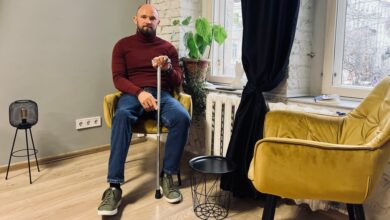Here’s why you can’t sleep and tips to fix it

If you’re anything like me, there are nights when we just can’t seem to fall asleep for no reason — even if we slept well the night before.
There is no worse feeling than writhing under sweaty sheets, feeling the frustration and panic as morning approaches. “I’ll be so tired tomorrow,” I told myself. “Damn brains, I demand you relax right now!”
It turns out that whipping my fears into a frenzy is the exact opposite of what sleep experts advise. Most will have trouble sleeping from time to time and thankfully, as our understanding of the brain grows, there are strategies to remedy this.
Here’s why sleep can seem so elusive some nights, and what doctors recommend when it comes to haying.
What happens in the brain during sleep?
Falling asleep isn’t an “on or off switch” but rather a gradual process, according to Charles Morin, a clinical psychologist, Canada’s research chair in behavioral sleep medicine and professor at Université Laval in Quebec City.
If all goes well, from the moment we lie down and close our eyes, a sense of relaxation builds as our brain activity slows down, becoming more orderly as we fall asleep, he said. During the night, our brain goes through four stages — three non-dreaming stages, followed by a dreaming state known as Rapid Eye Movement (REM) sleep. The whole process takes about 90 minutes before repeating.
The non-dreaming phase of sleep is getting deeper and deeper the neurons of the brain become more synchronized, until it reaches stage three – known as deep sleep or slow wave sleep. Studies show that this phase is related to the “recovery of physical energy,” Morin said — “you’re more likely to wake up with aches and pains” if you miss this phase.
Meanwhile, REM sleep is vital for emotional processing; if we don’t get enough of it, we’re more likely to wake up in a bad mood, he continued. Both REM and slow wave sleep are important for processing and storing the memories of the day, he said.
Some scientists think slow wave sleep is “the most restorative part of sleep,” says Eva Libman, a clinical psychologist and co-director of the Behavioral Psychotherapy & Research Unit in the Department of Psychiatry at Montreal’s Jewish General Hospital.
More specifically, the first two cycles of slow wave sleep — which correspond to the first three to four hours of sleep — are the most helpful. “Those three or four hours is what we call ‘core sleep,’ and is what we believe an individual absolutely needs to stay more or less healthy,” Libman said — though that doesn’t mean the rest isn’t important.
Why can’t I fall asleep at night?
There’s a wide variety of factors that influence our sleep, with perhaps the biggest contributor being stress, anxiety or depression, Morin said. “Stress is incompatible with sleep. Your mind and body should be in a relaxed state,” he said. “This is disturbed by worry or by physical discomfort.”
So when I demanded my brain to shut up and go to sleep, it had the opposite effect, instead exciting and energizing my mind at a time when it should be decaying. Often this leads to a vicious cycle, where we can’t sleep because we’re stressed and we’re stressed because we can’t sleep, Morin continued.
This is compounded by the fact that our thoughts tend to get more intense when we’re in bed without distractions, “most likely because there’s a lot less stimulation coming to your brain,” Libman said. These thoughts don’t have to be negative either; “Even if you have very vivid but pleasant thoughts, it will affect your sleep quality or your ability to fall asleep.”
Azadeh Yadollahi is a senior scientist who studies sleep at University Health Network’s KITE research institute in Toronto. We all have an internal clock known as our circadian rhythm, which controls many of our bodily functions, including sleep, Yadollahi explains.
This clock responds to light, especially blue light. This means that if we are exposed to bright light before going to bed, such as looking at a computer or phone screen, it inadvertently tells our brain that it is morning and suppress sleep signals in the body like melatonin.
Along the same lines, our bodies are built around daily routines; if our sleep schedule is disrupted, such as during daylight savings time or even sleeping in on weekends, our sleep quality will be affected, the experts say. Therefore, shift workers who work non-traditional hours are at an increased risk of heart attack and stroke, according to research.
Regular exercise and eating well during the day can help you sleep better, Yadollahi said — but not for the reason you might expect. Eating a high-salt diet can cause more fluid to flow into our tissues, leading to swelling in the neck. This can then narrow our airways, contribute to snoring and cause oxygen levels to drop, which wakes us up.
Likewise, if we sit for long periods of time, fluid starts to build up in our legs. Lying down, this fluid then rushes into our upper body and neck, causing the same problem. But when we exercise, our muscle movements help push this fluid evenly through our bodies: “Half an hour of walking (every day) can really improve sleep quality and can actually improve sleep by about 20 to 25 percent,” said Yadollahi.
That said, exercising too close to bed is also a no-no, as a workout can increase our body temperature. That clashes with our internal clock, which tries to lower body temperature before you go to bed: “You’re actually raising your body temperature, and that contradicts the pattern you need to sleep,” Yadollahi said.
What can I do to sleep better?
Now that we know the main factors that keep us awake, we can incorporate habits into our daily routines to reduce them.
For example, if you didn’t sleep well the night before, a nap during the day could make things worse by disrupting your internal clock, Morin said. Instead, try to go to bed and wake up at the same time every day – in addition to strengthening your circadian rhythm, the tiredness we feel throughout the day can help us fall asleep.
If you’re wide awake in bed after 15 to 20 minutes, Morin recommends getting out of bed and going into the bedroom to do something else, like reading in low light, until you feel sleepy again. “There’s no point in forcing sleep, you can’t,” he said.
Also consider reducing the amount of light you’re exposed to at night and avoiding screens in the hours before going to bed. If you must use electronics, consider using a blue light filter, Libman said — although all types of light can be distracting.
Otherwise, Libman recommends wearing sunglasses at night when it’s still sunny, and keeping your bedroom dark (a little light is OK — you probably don’t need blackout curtains, she said). For the same reason, Libman advises against turning on the bathroom light when we get up at night to pee — consider buying an energy-efficient toilet nightlight instead.
It can sometimes seem impossible to control our thoughts, but there are strategies for this too. Meditating or practicing relaxation techniques before going to bed can help, but Libman prefers to read – a novel by lamplight is less harsh than bright electronic screens, and a story helps keep the brain busy: on something else… and that’s a very good one. way to help people disconnect from the world around them and eventually fall asleep.”
Similarly, Libman recommends listening to audiobooks, radio, or podcasts, but not ebooks (because of the bright screens) or music (not as distracting as following a story).
It’s important to get some exercise every day, and the best time to do this is late afternoon, Yadollahi continued. Along the same lines, it is better to use a blanket in a cooler room rather than turning up the thermostat as our body temperature drops leading up to bedtime.
Finally, Morin advises against taking sleep aids, including melatonin. Drugs are not a sustainable long-term solution to insomnia, he said: “There is no sleeping pill that can give you back natural sleep.”
When should I see a sleep doctor?
It’s perfectly normal to have trouble sleeping from time to time, but if it consistently takes longer than half an hour to fall asleep, you should see a doctor, Yadollahi said.
If you’re constantly waking up tired despite seeming to sleep through the night, especially when you’re young, consider seeing a doctor, Libman said. This could be a warning sign of sleep apnea, a common sleep disorder, or other things going wrong at night.
“Sleep is just as important, if not more important, than the perfect diet and exercise,” Morin said. “You have to make sleep a priority in your life.”





